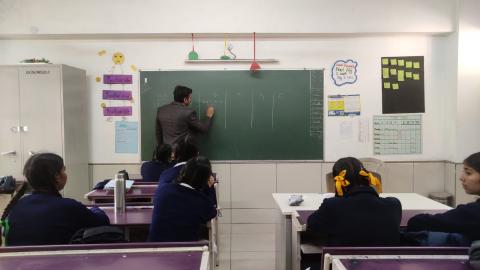
Education in Transition: Challenges and Hopes in Public Education
As the year comes to an end today, it's a time when most of us enter a reflective mode, contemplating how we spent the past year and envisioning how we want the new year to unfold before us. Interestingly, the first day of the year was a Sunday, and on that day, I wrote a reflective diary from Gulmarg, Kashmir. Coincidentally, the last day of the year is also a Sunday, making today the day for another reflective diary, this time written from Delhi. Throughout the year, my focus has been more or less on education, and I strongly believe that anything related to school education should be commented on by the teachers.
Although I am a part of a public education system that is striving to revive the declining credibility of public education, after nine years of relentless effort, the future appears to be very challenging for public education.The battle is uneven. The struggle to revive the public education system is set against global capital, which seeks a profitable market, whether it's in the education sector or healthcare. Mighty governments also bow down before the power of global capital, which controls the narrative through the media. The effort to revive a public education system is a modest step against the challenges posed by the new liberal economy.
For a small, ‘talented’ segment, this situation presents a significant opportunity for a ‘good life', at least in terms of modern parameters—such as a good salary, a big car, health insurance, and a couple of foreign trips. This scenario can unleash unimaginable misery for the millions of poor people living across the length and breadth of the country. As of now, there doesn't seem to be any thinking in the governance to protect their interests. Public institutions, particularly government schools and universities, offer transformative opportunities for children from poor and disadvantaged sections of society. The further deterioration of public institutions will seal the fate of the poor.
While access to digital education may be portrayed as a life-changing opportunity for the poor, it's challenging to dismiss the need for well-developed public institutions for children from the poor and disadvantaged sections of society. Schools are not only meant for education but also serve as primary spaces for socialisation and networking. The absence of such spaces may hinder opportunities in the lives of students, which digital spaces may not replace.
Life is not possible without hope. Humanities have faced huge challenges in the past and have overcome them. I trust there will be alternative thinking in terms of protecting the rights and dignity of the poor and downtrodden by devising proper means of education that are equitable and inclusive. In India, the discourse on inclusion is more important than the discourse on quality. In fact, inclusivity of a system should be seen as a parameter of good-quality education. I believe the new economic world order, despite its obsession with profit, may not be in a position to dismiss the rights of children to a quality education. The next year will be very interesting to wait and watch in this context, observing how education policy unfolds and who benefits from it.
- Log in to post comments
